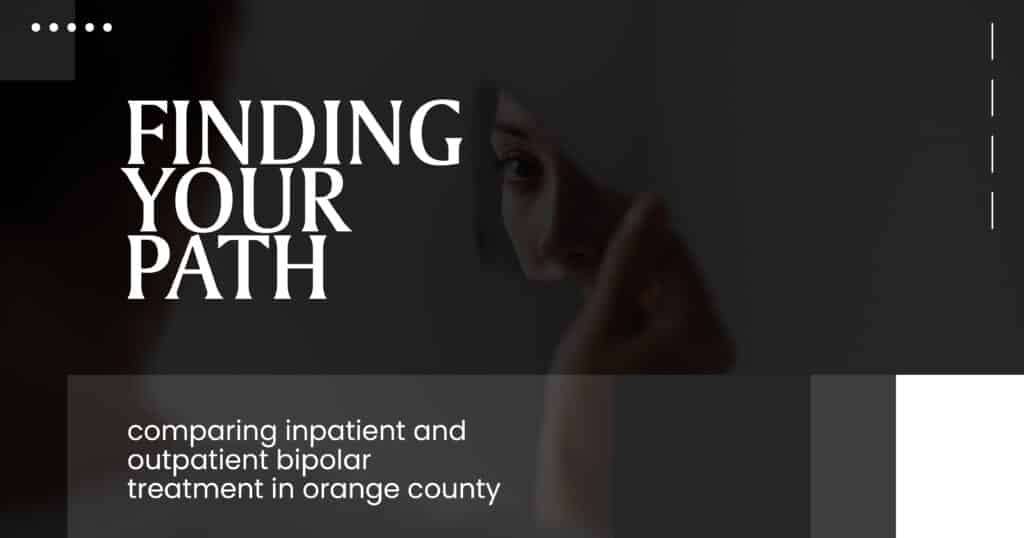Living with bipolar disorder can feel like a constant rollercoaster of intense highs and lows. When getting treatment, choosing between inpatient and outpatient care can be challenging. Both choices are available in Orange County, known for its top-notch healthcare options. This article breaks down each type of treatment so you can decide what’s best for you.
Understanding Bipolar Disorder
Bipolar disorder is a mental health condition marked by extreme mood swings. These swings can include high-energy periods (mania or hypomania) and low-energy periods (depression). They affect sleep, energy levels, behavior, and clear thinking.
Types of Bipolar Disorder
- Bipolar I Disorder: Includes severe manic episodes often followed by depressive episodes.
- Bipolar II Disorder: Involves depressive episodes and less severe hypomanic episodes.
- Cyclothymic Disorder: Features periods of hypomanic and depressive symptoms over at least two years.
Comparing Inpatient and Outpatient Bipolar Treatment in Orange County
What is Inpatient Treatment?
Inpatient treatment means staying at a psychiatric hospital or a specialized mental health facility for a period, usually from a few days to several weeks. This option suits those needing close monitoring and support.
Benefits of Inpatient Treatment
- 24/7 Care: Constant supervision ensures quick help if symptoms worsen.
- Structured Environment: A controlled setting reduces stress and distractions.
- Comprehensive Support: Access to a team of experts like psychiatrists, psychologists, nurses, and therapists.
- Medication Adjustments: Safe environment for changing medications or detoxing from substances.
Challenges of Inpatient Treatment
- Cost: It can be expensive without good insurance.
- Disruption: Time away from work, school, and family.
- Stigma: Some may feel judged for needing this level of care.
What is Outpatient Treatment?
Outpatient treatment allows patients to live at home while attending therapy sessions and appointments with healthcare providers.
Benefits of Outpatient Treatment
- Flexibility: Maintain daily routines and responsibilities.
- Cost-Effective: Generally cheaper than inpatient care.
- Support Networks: Receive support from family and friends.
- Range of Services: Access to therapy, medication management, support groups, and educational programs.
Challenges of Outpatient Treatment
- Less Monitoring: Limited supervision can be challenging for severe symptoms.
- Self-Motivation: Requires commitment to follow through.
- Environmental Triggers: Stay in potentially stressful settings that might worsen symptoms.
Key Considerations When Choosing Between Inpatient and Outpatient Treatment
Symptom Severity
- Severe Symptoms: Inpatient care may be needed for safety during intense episodes.
- Mild to Moderate Symptoms: Outpatient care can work for managing daily life.
Support Systems
- Strong Support: Outpatient care can be effective with a supportive network.
- Limited Support: Inpatient care offers structure needs to be improved at home.
Financial Factors
- Insurance Coverage: Check what your insurance covers.
- Costs: Consider what you can afford and seek financial help if needed.
Personal Preferences
- Comfort: Some prefer the structured setting of inpatient care, while others like the freedom of outpatient treatment.
- Lifestyle: Choose what fits best with your daily life and responsibilities.
FAQs
Q: Can I switch from outpatient to inpatient treatment if needed?
A: Absolutely! Treatment plans should be flexible. If outpatient treatment isn’t enough, you can transition to inpatient care for more intensive support.
Q: How long does inpatient treatment typically last?
A: The duration varies but generally ranges from a few days to several weeks, depending on the severity of symptoms and individual needs.
Q: Are there outpatient programs specifically designed for bipolar disorder?
A: Yes, many outpatient programs specialize in bipolar disorder and offer tailored therapy, support groups, and medication management.
Q: Can I receive holistic treatments in both inpatient and outpatient settings?
A: Yes, many facilities offer holistic treatments such as yoga, meditation, and nutritional counseling as part of their inpatient and outpatient programs.
Q: How do I know if inpatient treatment is proper for me?
A: Consider factors such as the severity of your symptoms, your support system, financial situation, and personal preferences. Consulting with a mental health professional can also help you make an informed decision.
Conclusion
Deciding between inpatient and outpatient treatment for bipolar disorder is personal and challenging. By comparing the options in Orange County, you can weigh what’s best for your needs. Whether you choose intensive inpatient care or flexible outpatient treatment, know there’s support and hope available. Contact us for help from our mental health professional to start your journey toward stability and well-being.





